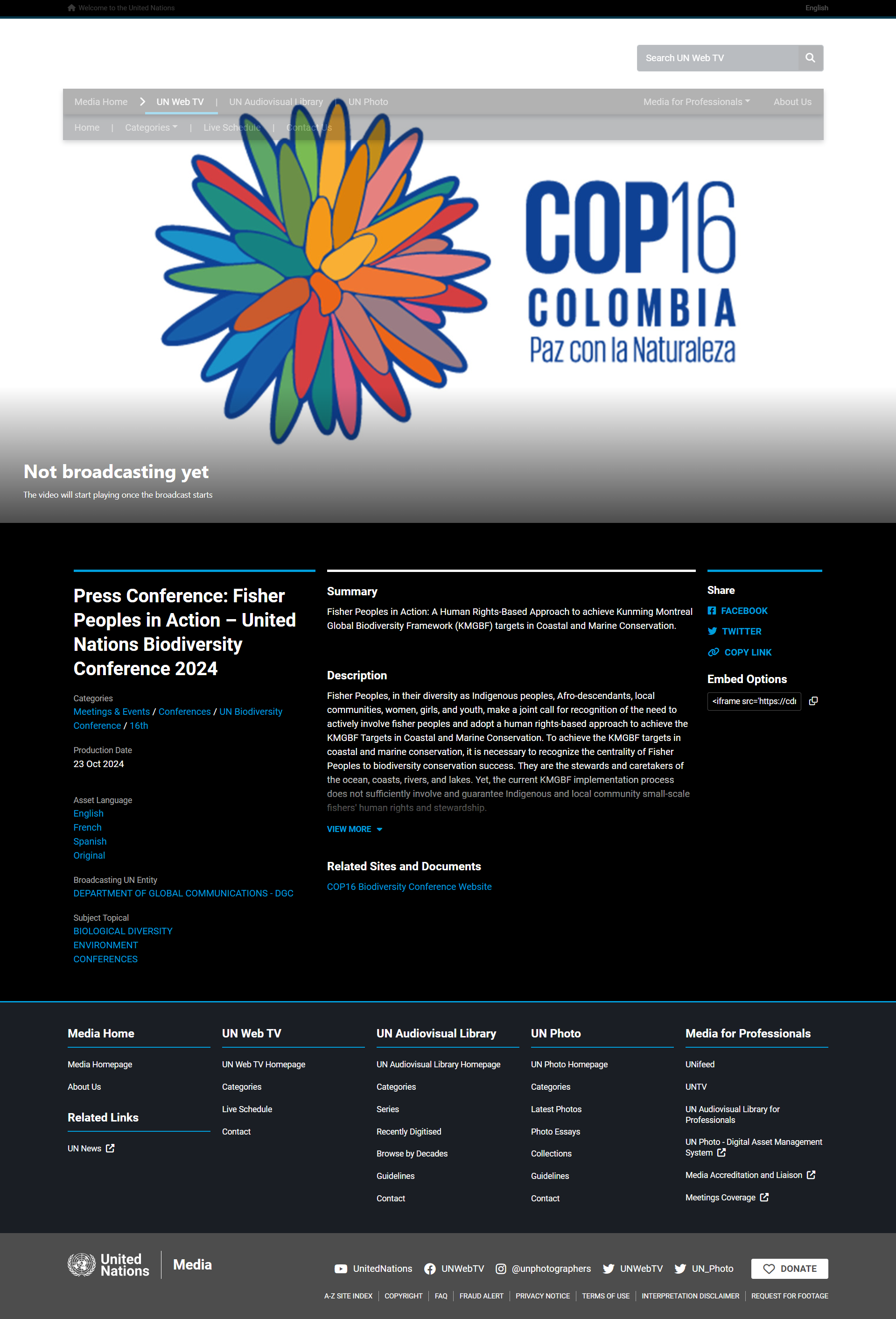
Water covers 70 percent of the Earth. Marine and freshwater environments sustain an abundance of life in its spectacular diversity. Through our history, small-scale fishing communities have interacted and depended on these living resources. A threat to aquatic environments is a danger to artisanal fishers.
Their protection and stewardship are essential to the communities and cultures they sustain. This relationship is a framework to manage conflicts and improve the quality of life and livelihood of small-scale fishers. It was recognized in the UN Convention on Biological Diversity.
Governments increasingly designate marine protected areas (MPAs) for conservation and management. This legal instrument does help but its implementation has raised serious concerns. Target-driven expansion of MPAs is fixated on quantitative goals. This has hit the rights, livelihoods and sustainable use practices of small-scale fishing communities. MPAs—created often in a non-consultative and non-participatory manner—have focused on regulating/restricting their fisheries, failing to recognize their sustainable livelihoods, culture and survival.
It is imperative that protection efforts are grounded in principles of sustainable use. That their processes are inclusive and recognize</b< traditional local systems of knowledge and governance, building upon them. Artisanal fishers must be the frontline of marine biodiversity conservation. There is an urgent need for systematic improvements on all such matters.
A range of ICSF’s initiatives highlight the social and political dimensions of conservation. The importance of livelihoods of poor and vulnerable communities, of their participation and consultation. The co-management of resources by fishing communities, based on a human rights approach to conservation.

Fisher Peoples in Action: A Human Rights-Based Approach to achieve Kunming Montreal Global Biodiversity Framework (KMGBF) targets in Coastal and Marine Conservation. Description: Fisher Peoples, in their diversity as Indigenous peoples, Afro-descendants, local communities, women, girls, and youth, make a joint call for recognition of the need to actively involve fisher peoples and adopt a human rights-based approach to achieve the KMGBF Targets in Coastal and Marine Conservation. To achieve the KMGBF targets in coastal and marine conservation, it is necessary to recognize the centrality of Fisher Peoples to biodiversity conservation success. They are the stewards and caretakers of the ocean, coasts, rivers, and lakes. Yet, the current KMGBF implementation process does not sufficiently involve and guarantee Indigenous and local community small-scale fishers’ human rights and stewardship. For more details, please visit: https://webtv.un.org/en/asset/k15/k15icg47f5

International Collective in Support of Fishworkers (ICSF) Press Conference: Fisher Peoples in Action – United Nations Biodiversity Conference 2024 23 October 2024 Statement Call for Inclusion of Small-Scale Fishers as...
The statements from Parties highlighted the importance of National Biodiversity Strategies andAction Plans (NBSAPs) as the primary tool for implementing the Convention and the Kunming Montreal-Global Biodiversity Framework (KM-GBF) at...

Around 20,000 delegates from about 190 countries convened at Montreal, Quebec, the seat of the UN CBD Secretariat, to guide global action to protect nature through 2030 amid protests from...
This Handbook, developed by ICSF and Crocevia, describes the components of the Convention on Biological Diversity (CBD) and provides an overview of its programmes, targets and commitments on aquatic, marine...
Small-scale fisheries (SSF) operate in both marine and inland waters, accounting for over half of the total fish catch in developing countries. The bulk of this catch is destined for...
This research reflects on the progress achieved by conservation partners in South Africa on the implementation of the Convention on Biological Diversity (CBD) Programme Element. It explores the strategies and...
The workshop reviewed existing legal and institutional mechanisms for creating, implementing and reporting MCPAs in India, and discussed their impact from the perspective of environmental justice and human rights and...

This document summarizes a series of case studies done in nine countries—Brazil, India, Indonesia, Mexico, Senegal, South Africa, Spain, Tanzania and Thailand—on the role of communities in the planning and...
This study examines how Thailand’s biodiversity conservation measures affect fishing communities, especially in the marine protected areas (MPAs) on the Andaman Sea coastline. It documents the various efforts of the...
This is the report on the workshop on “Small Indigenous Freshwater Fish Species: Their Role in Poverty Alleviation, Food Security and Conservation of Biodiversity”, organized by the ICSF in collaboration...
Freshwater ecosystems are highly biodiverse1 and important for livelihoods and economic development, but are under substantial stress. To date, comprehensive global assessments of extinction risk have not included any speciose...
Nature is core to Canada’s national identity, is a source of pride, and is the foundation of our daily lives. But the science is clear: nature is in trouble. Biodiversity...
The EU’s biodiversity strategy for 2030 is a comprehensive, ambitious and long-term plan to protect nature and reverse the degradation of ecosystems. The strategy aims to put Europe’s biodiversity on...
The IPBES Transformative Change Report, prepared by over 100 experts from 42 countries over three years, addresses the urgent need to halt and reverse biodiversity loss to prevent irreversible ecosystem...
The second resumed sessions of the 16th meeting of the Conference of the Parties (COP) to the Convention on Biological Diversity (CBD), the 11th meeting of the COP serving as...
India has a rich tradition of biodiversity conservation, which predates the global biodiversity movement and the establishment of the Convention on Biological Diversity (CBD). The journey toward formal biodiversity management...
2024 United Nations Biodiversity Conference – SBI 5 / CBD COP 16 / CP-MOP 11 / NP-MOP 5 The fifth meeting of the Subsidiary Body on Implementation (SBI 5) of...
The 16th meeting of the Conference of the Parties to the Convention on Biological Diversity (COP 16) was suspended in the morning of Nov. 2 but not before countries agreed...
2024 United Nations Biodiversity Conference – SBI 5 / CBD COP 16 / CP-MOP 11 / NP-MOP 5 Working Group II considered conference room papers (CRPs) throughout the day. Two...
2024 United Nations Biodiversity Conference – SBI 5 / CBD COP 16 / CP-MOP 11 / NP-MOP 5 The Working Groups addressed conference room papers (CRPs) throughout the day. Contact...